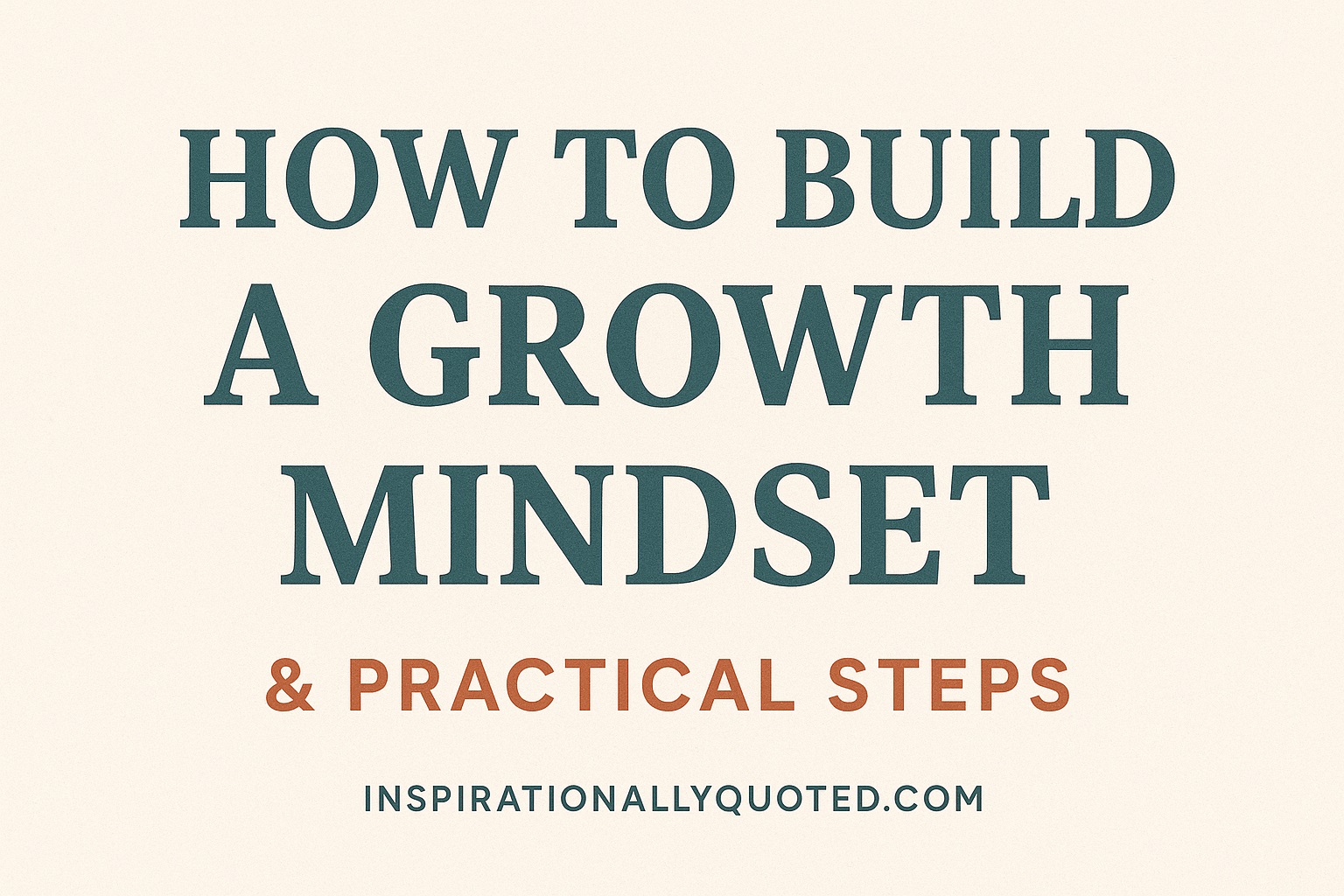Picture two students who both fail the same math test. One sighs, “I’m just not good at math. What’s the point in trying?” The other shrugs, “I didn’t study enough this time — I’ll figure out where I went wrong and do better.”
Same situation. Two mindsets. Two very different futures.
This difference is what psychologist Dr. Carol Dweck famously described as the growth mindset versus the fixed mindset. A growth mindset is not just about being positive — it’s about believing you can learn, adapt, and grow. It changes how you see challenges, failure, and effort. And building this mindset is one of the most powerful things you can do to unlock your potential.
As Dweck puts it:
“In a growth mindset, people believe that their most basic abilities can be developed through dedication and hard work.”
This article is your complete guide to understanding and building a growth mindset. Let’s dive in.
What Is a Growth Mindset
At its core, a growth mindset is the belief that skills and intelligence are not fixed traits — they can be developed.
By contrast, a fixed mindset assumes your abilities are carved in stone. If you’re “not good” at something, you’ll never be good at it. That belief leads to fear of failure, avoidance of challenges, and giving up easily.
A growth mindset, on the other hand, says:
- Failure is feedback, not a dead end.
- Effort is the path to mastery.
- Criticism is a tool, not an attack.
- Challenges are opportunities, not threats.
Why a Growth Mindset Matters
Having a growth mindset doesn’t just help you at school or work — it shapes your entire life.
- In Learning: You’ll approach new skills with curiosity instead of fear.
- In Careers: You’ll adapt in fast-changing industries instead of being left behind.
- In Relationships: You’ll see conflict as a chance to grow, not just to win.
- In Mental Health: You’ll develop resilience, grit, and optimism.
As Confucius wisely said:
“It does not matter how slowly you go as long as you do not stop.”
Recognizing a Fixed Mindset
Before you shift into growth, it helps to spot where you might be stuck in a fixed mindset. See if any of these sound familiar:
- “I’m just not a creative person.”
- “If I fail, it means I’m a failure.”
- “I hate being criticized — it makes me feel worthless.”
- “Why bother trying? I’ll never be as good as them.”
These thoughts are common — but they are not the truth. They’re just mental habits. And habits can be changed.
Five Steps to Build a Growth Mindset
1. Embrace Challenges
Instead of avoiding hard tasks, lean into them. Growth lives at the edge of your comfort zone.
- Practical tip: Each week, choose one thing you usually avoid because it feels “too hard.” Do it anyway.
Quote to remember:
“The expert in anything was once a beginner.” — Helen Hayes
2. Learn from Failure
Reframe failure as feedback. Every mistake is a map pointing you to where you need to grow.
- Practical tip: After setbacks, ask: What can I learn? What can I do differently next time?
Michael Jordan once said:
“I’ve failed over and over and over again in my life. And that is why I succeed.”
3. Use the Power of “Yet”
Fixed mindset says: “I can’t do this.” Growth mindset adds a single word: “I can’t do this… yet.”
That small shift changes impossibility into possibility.
- Practical tip: Notice your self-talk. Every time you say “I can’t,” add “yet.”
4. Value Effort and Process
In a fixed mindset, effort feels like proof you’re not smart enough. In a growth mindset, effort is the bridge to mastery.
- Practical tip: Track effort, not just outcomes. Journal about the steps you took, not only the results.
Quote:
“Success is the sum of small efforts, repeated day in and day out.” — Robert Collier
5. Surround Yourself with Growth
The people and messages around you shape your beliefs. Surround yourself with growth-minded people, inspiring content, and mentors.
- Practical tip: Read a growth mindset book, join a supportive community, or follow daily inspirational quotes (yes, like here at InspirationallyQuoted.com!).
Daily Practices for Growth
Here are a few simple practices you can build into your routine:
- Journal Prompt: “What challenge taught me the most this week?”
- Affirmation: “I am not limited by my past — I am always growing.”
- Visualization: Picture yourself succeeding after persistent effort.
- Quote Reminder: Pick one growth mindset quote and put it on your phone wallpaper for the week.
Overcoming Common Obstacles
- Fear of Judgment: Remember, everyone starts as a beginner.
- Comparison Trap: Focus on your progress, not someone else’s highlight reel.
- Slow Progress: Growth takes time — but every step counts.
As Henry Ford said:
“Failure is simply the opportunity to begin again, this time more intelligently.”
Resources to Deepen Your Growth Mindset
- Books: Mindset by Carol Dweck, Grit by Angela Duckworth.
- Podcasts: The Ed Mylett Show, The Tim Ferriss Show (episodes on learning and resilience).
- Tools: Growth mindset worksheets, journaling apps, or even a personal quote collection.
Conclusion: Your Growth Journey Begins Now
Building a growth mindset is not about never failing — it’s about learning, adapting, and persisting. It’s about turning obstacles into stepping stones and doubts into determination.
So here’s your challenge: Choose one small step this week to practice growth. Embrace a challenge, reframe a failure, or change your language with the power of “yet.”
Because in the end, your mindset shapes your reality. And the more you grow it, the more your life expands.
“Believe you can and you’re halfway there.” — Theodore Roosevelt
Frequently Asked Questions About Building a Growth Mindset
1. What is a growth mindset in simple terms?
A growth mindset is the belief that your abilities and intelligence can improve with effort, practice, and learning. Instead of saying “I can’t do this,” you learn to say, “I can’t do this yet.”
2. How do I shift from a fixed mindset to a growth mindset?
Start by noticing your self-talk. When you hear thoughts like “I’m just not good at this,” reframe them with growth language: “I’m learning, and I can improve.” Then, practice embracing challenges, treating failure as feedback, and celebrating small progress.
3. Can anyone develop a growth mindset?
Yes! A growth mindset isn’t a trait you’re born with — it’s a skill you can build. With awareness, consistent practice, and supportive environments, anyone can shift their mindset and grow.
4. What are some daily habits to strengthen a growth mindset?
- Journaling about lessons learned from mistakes.
- Using affirmations like “I grow stronger with every challenge.”
- Reflecting on progress at the end of the day.
- Surrounding yourself with inspiring quotes, books, and growth-minded people.
5. Why is a growth mindset important in everyday life?
Because it shapes how you handle challenges. With a growth mindset, failures don’t define you — they teach you. This leads to resilience, motivation, stronger relationships, and better long-term success.



